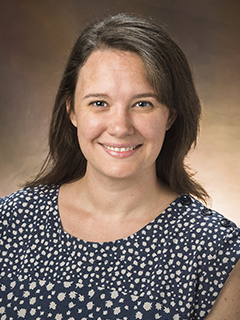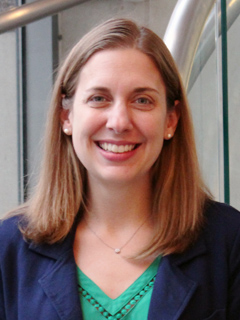HOW CAN WE HELP YOU? Call 1-800-TRY-CHOP
In This Section
ASCGT 26th Annual Meeting Well-Attended by CHOP Scientists
Scientists from Children's Hospital of Philadelphia headed to Los Angeles, California to share their work and connect with colleagues during the American Society of Cell & Gene Therapy (ASCGT) 26th Annual Meeting. The event officially expanded to a four-day program for 2023, and runs from May 16-20 at the Los Angeles Convention Center.
On the first day of ASCGT, the Foundation for the National Institutes of Health announced the eight rare diseases selected for grant support from the Accelerating Medicines Partnership Bespoke Gene Therapy Consortium (AMP BGTC) clinical trial portfolio. CHOP will be the lead site for the study of multiple sulfatase deficiency, a neurologic genetic disorder that affects the SUMF1 gene, with Principal Investigator Rebecca Ahrens-Nicklas, MD, PhD, research scientist in the Division of Genetics and Laura Adang, MD, PhD, attending physician in the Division of Neurology .
AMP BGTC is a public-private partnership between the NIH, U.S. Food and Drug Administration, biopharmaceutical and life science companies, and non-profit and other organizations to encourage the development and delivery of personalized gene therapies that could treat those affected by rare genetic diseases.
"This is an unprecedented opportunity to meet the needs of families affected by rare diseases," Dr. Adang said. "We are honored to represent our leukodystrophy and lysosomal storage disorder families who have worked so hard to reach this incredible milestone. The impact of these rare diseases on individuals and their families cannot be overstated. The opportunity to represent our families and offer them hope by collaborating on innovative solutions is an incredible honor."

Laura Adang, MD, PhD
ASGCT meeting events kicked off May 16 with a workshop on the steps necessary to becoming a site for adeno-associated virus (AAV) gene therapy trials. Denise Sabatino, PhD, investigator in the Raymond G. Perelman Center for Cellular and Molecular Therapeutics, led a discussion on patient follow-up and long-term toxicity associated with therapy treatments in clinical trials, followed by a panel discussion. Her research focuses on using gene therapy to provide sustainable treatments for patients with Hemophilia A, a bleeding disorder caused by mutations in the factor VIII gene. Dr. Sabatino will also be a panelist during a discussion May 20 on gene therapies to address gaps in veterinary medicine.
Additionally, Stefano Rivella, PhD, scientific director of the CuRED Frontier Program, co-chaired a session titled "Risks of Autologous ex vivo Gene Therapy and Considerations for Improvement" in which he discussed alternative conditioning methods to chemotherapeutic conditioning agents that carry risks of malignancy, risks of clonal hematopoiesis arising from gene therapy, and therapeutic chimerism levels in ex vivo gene therapy.
A May 17 poster session features five studies co-authored by CHOP researchers. Highlights include Sarah Taisan, MD, attending physician in the Center for Childhood Cancer Research and co-author on a study that describes the development and testing of a CRISPR Cas9 genome engineering strategy to generate ex vivo genome-engineered human plasma cells to mediate T cell activation and direct T cell killing of cancerous cells.
CHOP investigators will also be featured during the Presidential Symposium that recognizes several of the top submitted abstracts. Stephan Grupp, MD, PhD, director of translational research in the Center for Childhood Cancer Research and co-authors describe their work in transfusion-dependent beta-thalassemia and sever sickle cell disease. CHOP Research Institute Chief Scientific Strategy Officer Beverly Davidson, PhD, and colleagues are among those presenting their research on using AAV-mediated RNAi delivery to treat amyotrophic lateral sclerosis (ALS), a fatal disease characterized by death of motor neurons.
Wednesday's oral presentation session will also feature a new model of alpha-thalassemia, caused by insufficient production of the alpha-globin protein. The model demonstrated the effects of treating alpha-thalassemia with autologous bone marrow transplant following ex vivo transduction with a human alpha-globin expressing lentiviral vector. The results indicated a specific lentiviral vector, ALS20αI, may be a promising candidate to help treat patients with Bart's Hydrops Fetalis Syndrome.
Joseph Rossano, MD, chief of the Division of Cardiology, and Kimberly Lin, MD, attending cardiologist and medical director of Cardiomyopathy at CHOP, along with scientists from several other institutions, are presenting their research during the Clinical Trials Spotlight Symposium May 18. Their phase 1 trial in Danon disease, a rare X-linked monogenic cardiomyopathy and multisystemic disorder, demonstrated that immunomodulation enabled safe gene therapy administration, resulting in cardiomyocyte transduction and improved autophagy.
Laura Breda, PhD, research assistant professor in the Rivella laboratory, was first author for an oral presentation on the development of a novel CD117 (stem cell factor receptor) targeted lipid nanoparticle that encapsulated modified mRNA to achieve ex vivo and in vivo genome engineering and control of cell fate.
William Peranteau, MD, attending surgeon in the Division of Pediatric General, Thoracic and Fetal Surgery, and his team of CHOP and University of Pennsylvania scientists were selected in addition to four other CHOP-authored studies for the annual meeting's second poster session. Their research focused on the ability of lipid nanoparticles delivered in animal models to target fetal skin subject to genetic skin disorders that are difficult to treat after birth.
Additional highlights include Dr. Rivella and colleagues' use of an erythroid-specific lentiviral vector to improve anemia and iron metabolism in a new congenital sideroblastic anemia disease model and Lindsey George, MD, leader of the Novel Therapeutics for Bleeding Disorders Frontier program and co-authors' findings that B-cell targeted therapies deplete neutralizing antibodies to adeno-associated virus.
In the May 19 abstract session, Dr. Davidson and CHOP colleagues explore the ways in which animal models are assisting the transition of cochlear gene therapy to treat hearing loss, one of the most challenging genetic disorders to treat with gene therapy.
Friday's poster session will feature two more CHOP author teams led by Dr. Davidson and Dr. Peranteau. Their posters demonstrate the results of using cytosine base-editing to treat spinocerebellar ataxia Type 2 (SCA2), an autosomal dominant disorder that causes ataxia, dementia, and death; and the clinical applicability of in utero gene therapies to treat monogenic lung diseases, respectively.
Visit the ASCGT 26th Annual Meeting webpage for a detailed itinerary and presentation schedule.

